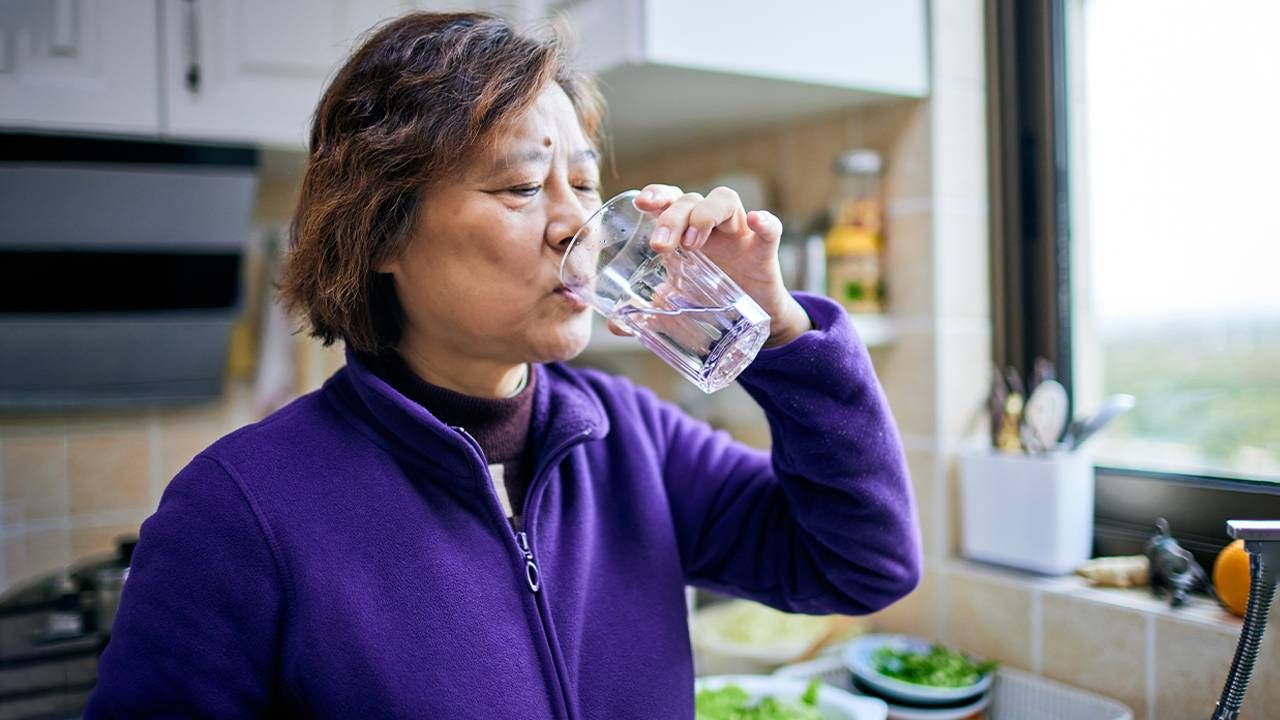Are You Drinking Enough Water?
And is sparkling water hydrating? Here's what we learned, along with tips to make water consumption easier.
Aging brings about physical changes that affect the body's ability to cool itself and to stay hydrated. You depend on water; in fact, it makes up more than half of your total body weight. It is necessary for temperature regulation, the elimination of waste, joint health, and more. Dehydration can occur if you do not have enough water in your body to carry out those tasks.

Medication Can Play a Role
Older adults are more apt to experience dehydration due to diabetes or renal disease. Some medications can affect a person's ability to stay hydrated, and often older adults do not perspire enough to cool their bodies during hotter days. Poor circulation or reduced sweat production due to medications can also play a role in the problem. Even the loss of 2% of a person's body weight has a negative effect on thermoregulation, physical activity and cognitive function. If an older person has balance issues or problems with mobility, that may hinder their ability (or willingness) to reach a water source.
"Those with cognitive impairment are particularly susceptible to dehydration."
Is It the Taste?
"[Older persons] often have diminished taste receptors, making bland things blander," says Kevon Owen of Owen Clinic in Oklahoma. "If they don't like water to begin with, it's hard to incentivize drinking it. Additionally, the inconvenience of going to the bathroom more often is another thing that can make drinking water not terribly appealing."
External factors, such as location, are also important to consider, says Michael Wasserman, chair of public policy committee, California Association of Long Term Care Medicine. "Certainly increased activity, living in a warmer climate, and lower humidity can increase fluid needs," he says. "Those with cognitive impairment are particularly susceptible to dehydration."
How Much Fluid Is Enough?
Organizations can't agree on a set answer to that question. The Mayo Clinic cites a recommendation by the U.S. National Academies of Sciences, Engineering, and Medicine which suggests 15.5 cups (124 oz.) of fluids per day for men, and 11.5 cups (92 oz.) of fluids per day for women.
But pay attention: that guideline includes all types of fluids sourced from foods and beverages as well as water. Many fitness and nutrition experts say that eight 8-oz. (64 oz.) glasses of water per day is enough. So how do you know you are drinking enough water?
"It depends on the situation," says Angel Planells, Seattle-based registered dietitian nutritionist (RDN) and national media spokesperson for the Academy of Nutrition and Dietetics.
"In general, a smaller person may need less than a larger person, and then it can go from there. It depends on your kidneys, your cardiovascular system, the medications you take and more."
"Urinary tract infections produce exponentially bigger problems in older people," says Owen. "But drinking more water would help to fight them."
Warning Signs of Dehydration
Plannells offers some tips on how to be aware of your hydration:
- Urine color. Is it light yellow or dark? “The lighter the better, but it doesn’t have to be clear,” says Plannells.
- Frequency of urination. You need to replace the fluids you have eliminated.
- Sweating/perspiring. During the summer, drink more to compensate for the heat.
- Skin elasticity. Does your skin bounce back quickly or does it take a while? A slow response could mean dehydration.
- Bad breath.
- Thirst. Be aware, though, that older people may have a limited ability to feel or communicate thirst.
- Lifestyle choices and living situation. Dressing too warmly for the summer heat, hot living conditions, overcrowding, and being in the direct sun can affect hydration.
Wasserman also advises caregivers to watch for these warning signs of inadequate water intake in patients:
- Dry mouth
- Confusion
- Irritability
- Headaches
- Constipation
Celery Counts: Making Hydration Appealing
How should a caregiver approach a patient who isn't drinking enough water, or perhaps rebels against drinking water?
Here's some good news. Water is important, but fluid intake is key to avoiding dehydration. Milk, juice and soda are all good for fluid intake, says Plannells. "Foods can also contribute to hydration. When we look at the word carbohydrate, you see the second half of the word is hydrate. So when we look at rice, potato, pasta, whole grains, and a number of fruits and vegetables, there will be some water absorbed from consuming some foods. Think light and refreshing."
Some helpful hydrating foods are:
- celery
- cucumber
- lettuce
- zucchini
- watermelon
- strawberries
- cantaloupe
- cauliflower
- peaches
- oranges and grapefruit
- broth and soups
- tomatoes
- peppers
- cabbage
- yogurt
Plannells warns that caffeinated beverages, including energy drinks, contain a natural diuretic and could increase urine production (and fluids would need to be replaced).
"Cold carbonated beverages may be able to quench a person's thirst more, which subsequently may result in consuming less water," he says.
Alcohol consumption can alter fluid levels in the body due to vasopressin, which is involved in the regulation of urine output.
"Seltzer [or sparkling] water is a tricky one," says Plannells. "Many persons have been told that it is dehydrating, but this is a myth. The mouth feel may be different, but it is just as hydrating."
Encouraging Words Caregivers Can Offer
If you are caring for an older person, acknowledge their reasons for not wanting to drink water. Explain how important hydration is for optimum health and reassure them that they are not being "a burden" or "difficult" when they need to use the bathroom more often, or when they ask for help. Find ways to manage hydration without disrupting their favorite routines.
"Plan certain parts of the day to drink more to make up for the times that it's less convenient to find bathrooms," suggests Owen. "Set goals to help them to drink more water. Make it something that you do together. Flavors and water are good, but some do not like the artificial sweetness of the flavors. Fruit is a good substitution."
"Cold carbonated beverages may be able to quench a person's thirst more, which subsequently may result in consuming less water."
In the case of a person with cognitive impairment, Wasserman says, the caregiver can use their imagination more and look for ways of encouraging fluid intake.
"Drinking with the person can encourage them, and make sure that fluids are readily available," he says.
Can You Drink Too Much Water?
According to Wasserman, excessive fluid intake can lead to hyponatremia, which may manifest as confusion, headaches, nausea and gait instability. To manage water intake, a caretaker could log the number of ounces or cups each day, and take note of times or situations when a loved one is more apt to drink water or other fluids. Call 911 if you see symptoms of hyponatremia or dehydration.
Learn More About Hot Weather Safety
These organizations offer resources for older adults as well as caregivers.
National Energy Assistance Referral Service
National Institute on Aging: Obtain free publications on hot weather safety in both English and Spanish on the website or call 1-800-222-2225.


